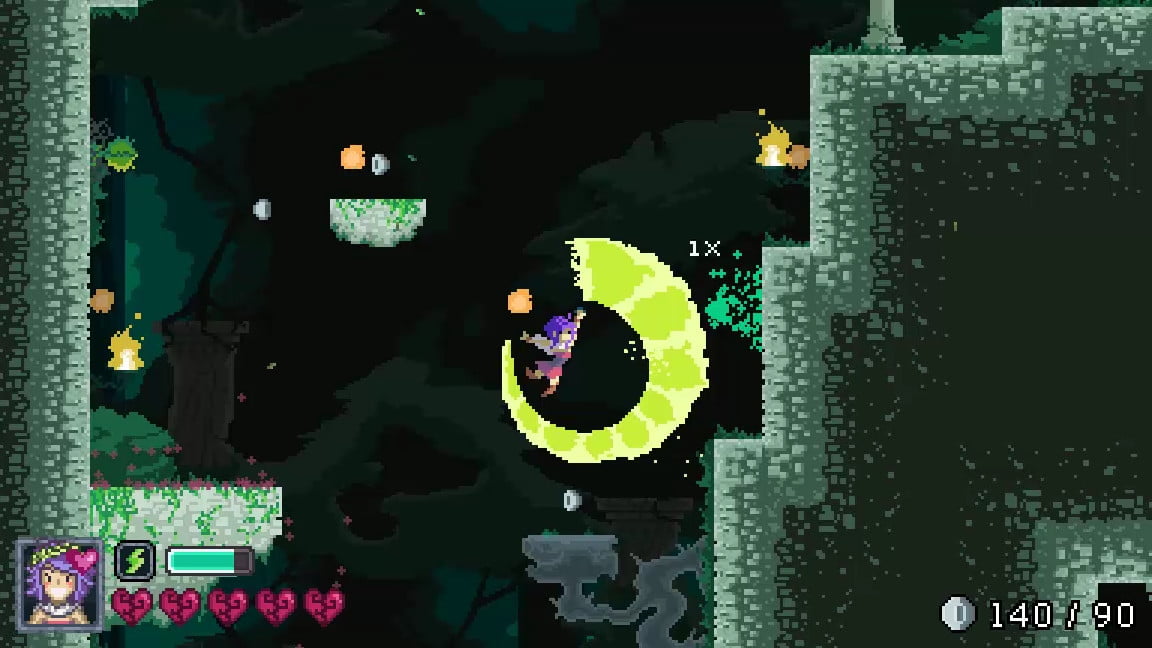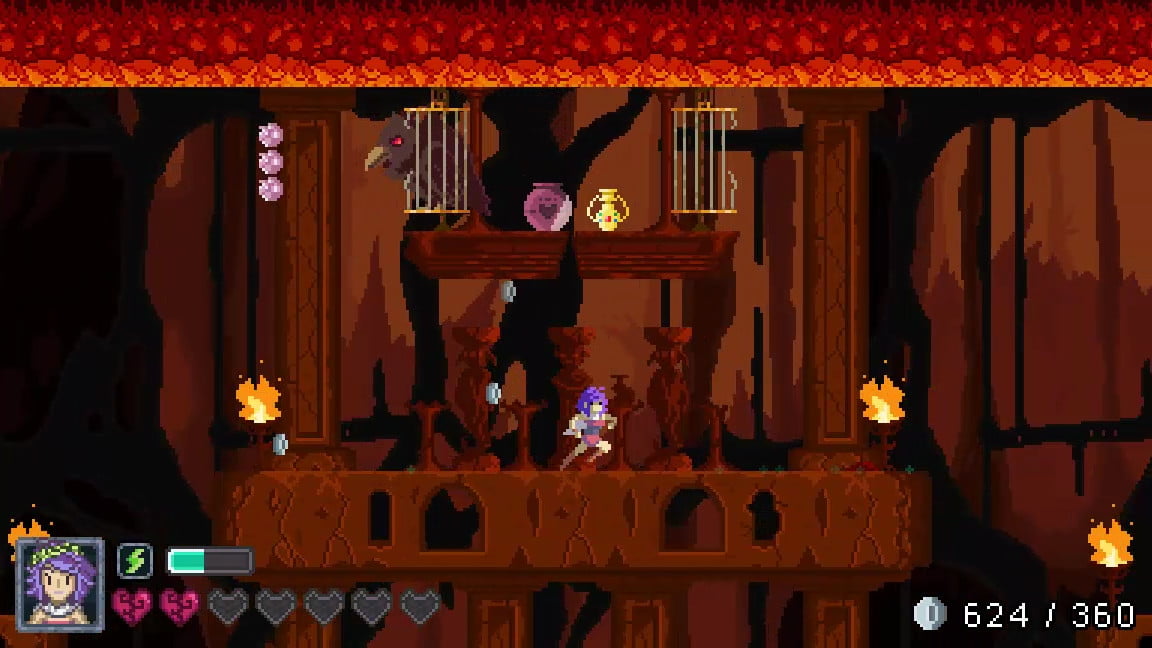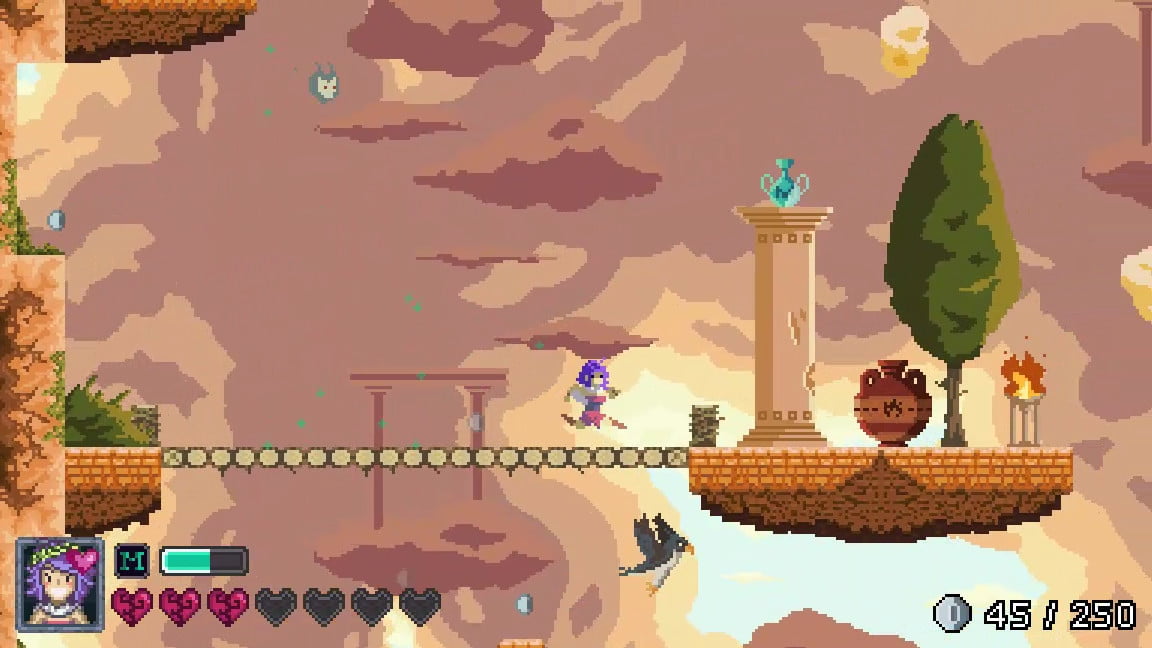As with Snakebird before it, there are some games which you play, you experience, and you set aside. In the case of Olympia Rising my metric is this game cost me as much as a pair of chocolate bars, and I definitely got to have more fun with it than I would have out of a pair of chocolate bars.
There’s your really basic point: Olympia Rising is almost perfectly $5 of videogame.

Sometimes a game gets on the list just because it’s interesting looking! Wanna know more about that? Well, let’s see what we got.
#fff, 1px -1px 0 #fff, -1px 1px 0 #fff, 1px 1px 0 #fff; -webkit-text-stroke: 1px white; padding: 30px;">The Game Rising
The core gameplay loop of Olympia Rising is pretty simple; you have a linear side-scrolling dungeon full of platforms, around which semi-predictable enemies move. It’s not one of your super-responsive, extremely precise games like the Dark-Souls-A-Like games people are so into lately. It’s got a little bit more of The Videogame to it, where some entities are moving within semi-random parameters, where sometimes they choose to do something and sometimes they choose not to.
It’s not one of your Mario-like simple-AI yields simple-emergence games, either. There’s just some entities that fly in odd patterns. Either way, the game is reasonably predictable but not perfectly so. I imagine it might be a nice game for your speedrunners if the play experience was particularly good.
In Olympia Rising, the game has an interesting success-failure system; you need to collect a certain number of coins to purchase the way on to the next level. Makes sense, right? The thing that makes the game more interesting is that you don’t reset all your coins at the end of each level – you just spend as much as you have to. This can mean some earlier levels can be played through nearly-perfectly, and you can save that progress up and use it to take easier, less risky routes through the later levels.

This mechanism is pretty cute, which helps you see your way through the game in stages, meaning that going back and re-attempting earlier levels, if using passwords, can get you an easier route going forwards. Hypothetically this could mean it’s easier to play the game and get to experience more of it rather than suffer and struggle your way through the really rough parts of the game.
It’s a pretty short game, too! It’s not like you’re going to need to replay it a lot to get to see most of the content! Yet did you catch that term up there…?
using passwords?

One of the strangest things about this game, though, is that with its small number of levels and reasonably linear play experience – you’re never opening up a totally unique way to play, just taking routes of different shape – is that the game has a password system and a single auto-save. You can’t save or have a level select, and that’s… weird?
The weirdness of the password system is emphasised by the fact the passwords are of non-English characters. They’re Greek symbols, which is kind of cool, until you realise it’s incredibly annoying as a way to track it beyond writing it down every time, or screenshotting it and then saving those screenshots. Numbers and letters are really good for composing passwords and conversations.

While I can praise the game for its lovely pixel art, fluid movement and rewarding gameplay, though, what really kicks this game down the stairs for me, what keeps me from turning this game into a diversion that entertained me a bit and turned it into a fast-delete-when-bored is that the user interface is so bad.
You know how back in the day when you played a PC game that was a port of a console game, you’d find the game just didn’t seem to know any other keys on the keyboard existed but the arrow keys and one or two others? That you might have to press enter to access a menu rather than the intuitively obvious escape? Or that a game wouldn’t consider the numpad arrows and the direction arrows the same keys? Olympia Rising does that. Exactly that.
A perfect example of how weird the controls are on this game is that when you want to learn the keys you have to have already pressed one of them; you have to get to the second stage of the menu, then hold down the down button until the game realises what you’re doing and shows you a scroll showing the commands. The non-customisable commands.
Really, this game is just awful for access, and that’s pretty annoying. What’s more it even forgets the volume you set it at every time you load it up, which… why? You’re dealing with a modern computer, you’re not trying to save space you’d normally have to write to to save information like configuration and keybinds.
#fff, 1px -1px 0 #fff, -1px 1px 0 #fff, 1px 1px 0 #fff; -webkit-text-stroke: 1px white; padding: 30px;">Verdict
You can get Olympia Rising on Steam and the Humble store. I’m told it’s also on the Wii U store and maybe the 3DS one? In those formats, the limited control scheme makes more sense.
Verdict
Get it if:
- It’s on sale. I mean you probably already own it.
- You want a fluid-feeling combo-based highly mobile game
- You really, really like the idea of dating a skeleton
Avoid it if:
- You’re bothered by a control scheme that feels like it’s from a NES, like actually from a NES
